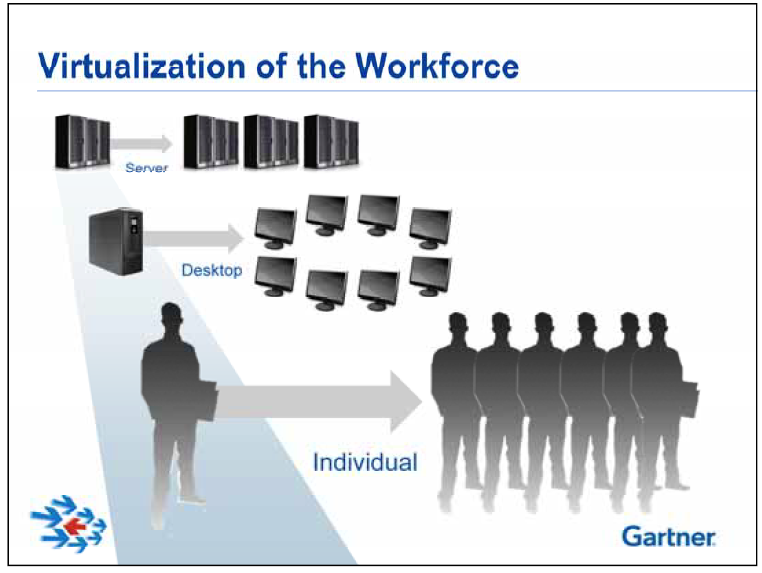Cloud computing's real creative destruction may be the IT workforce

Cloud computing, which amounts to be the industrialization of enterprise technology infrastructure, will bring a lot of advantages coupled with a lot of lost jobs.
Few disagree that cloud computing will be disruptive to industries, enterprise technology and the way we conduct businesses. The disruption will extend to the workforce.
In other words, humans will be virtualized just like servers are. The upshot from cloud computing is that companies will need fewer data centers. People run data centers. Those jobs are likely to simply disappear.
Johan Jacobs and Ken Brant, two Gartner analysts, made the cloud computing-jobs connection last week at the Gartner Symposium in Orlando. The presentation was categorized as "maverick" in that it may not happen in the allotted time frame. Jacobs and Brant argued by 2020 demand for IT staff dedicated to supporting data centers will collapse.
"The long-run value proposition of IT is not to support the human workforce – it is to replace it," wrote Gartner in its presentation. In other words, any job loss related to offshore outsourcing may look like a walk in the park once cloud computing gets rolling.
The rough argument goes like this:
- Computing will be outsourced to the cloud and become an IT utility.
- Business processes will be outsourced to software. That outcome will hit all economies---especially emerging ones like India that now dominate technology outsourcing.
- As the data center is virtualized the need for people to maintain that infrastructure will go away. In addition, all the people in sales and services linked to building and designing data centers will also lose jobs. When there's less technology infrastructure to support jobs will disappear.
- Some of those workers will reinvent themselves and find more opportunities. Others will never match those previous positions. Many IT workers will face hollowed out job prospects just like factory workers did as the U.S. manufacturing base disappeared.
This cloud computing-job connection is just a whisper today. But a few executives I talked to see an offshore outsourcing backlash as a possibility for cloud computing.
If Gartner's post-human industry theory, which dictates that intelligent machines will drive the economy more than people, pans out the economic implications will be huge. There is no need for a human-machine singularity to impact career prospects. Creative destruction looks great on the whiteboard, but there is a human cost.
What's the probability for this cloud vs. jobs scenario? In the long run, I'd argue it's highly likely. The timing---2020---is debatable. Jacobs and Brant highlighted a few scenarios.
- If companies move to private clouds and hybrid infrastructure the job losses won't be as large. Companies will need to maintain people and use brokers for public cloud services.
- Machines may complement humans more than replace them.
- However, companies may aim to eliminate assets. Call centers will be run by avatars and software. Business operations will be largely automated.
- IT utilities emerge. IT utilities will accelerate asset cuts. In this scenario, the goal is to drop physical assets in a hurry.
The last two outcomes will have the most impact on jobs. This scenario ties into what Harvard professor Clay Christensen said last week. Christensen noted that semiconductor companies tout how they are fabless. As a result, Intel is one of the few that actually owns manufacturing facilities. By worshipping profit ratios, companies nuke jobs. In the long run, this focus on ratios hurts innovation.
Gartner noted that this ratio worship is already underway:
CIOs believe that their data centers, servers, desktop and business applications are grossly inefficient and must be rationalized over the next ten years. We believe that the people associated with these inefficient assets will also be rationalized in significant numbers along the way. We foresee a substantial reduction in the U.S. IT workforce, especially among those supporting the data center and applications, in end-user organizations. According to Gartner's 2011 survey of U.S. CIOs, "Reducing the cost of IT," "Reorganizing IT" and "Consolidating IT operations and resources" were ranked high among their top strategies. In the same survey, "Virtualization" and "Cloud Computing" were the two top ranked U.S. CIO technology priorities; 83% of U.S. CIOs estimated that their organizations would conduct "more than half of their transactions on a cloud infrastructure" by 2020.
The other argument here is that IT is becoming a necessity good and that points to services provided by utilities. Toss in the fact that compensation is a large expense line in IT budgets and it's clear that there will be pressure to cut expenses via cloud computing and job cuts.
